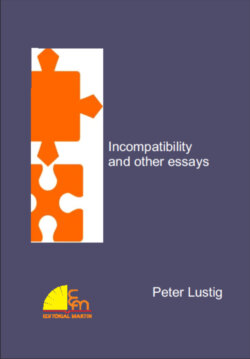Incompatibility and other essays

Описание книги
Incompatibility and Other Essays was conceived in response to the non-functioning of power politics, at the international level, and the universal suffrage, locally, in each separate country. The four essays that make up the book address some flaws that should seem familiar to everybody; but that are not usually discussed as they are presented here. It is recommended that opposite political systems, such as liberal dmocracy and statism, should iron out their differences and come to terms with each other, however irreconcilable. If antagonizing parties compromised over their differences, that might seem valuable and praiseworthy, but it would detract from the significance of their principles. The debate cannot be solved while it is regarded as a contest of wills, or a power struggle. There must be an underlying agreement about common concerns, before it can begin. And probably also about ethics. To expect that politics can be conducted between positions that are reciprocally excluding begs the question. At best, it boils down to simulation. There is a widespread conviction that universal suffrage is more likely to focus on the needs and wants of the larger poverty stricken sector, than to warrant the viability of the system. To get this right, its workings must be understood. It is not enough to express indignation or resentment against privilege. Whoever takes charge of the task should be able to prove that he is up to it. Profiteering from speculation to give capitalism a reputation wont't do. Ownership ought to hinge on investment amounting to the full worth of assets. The majority rule is the main reason why economies run short of liquidity; however much it speeds up the monetary cycle. Much as government may be regarded as a necessary evil, because security is considered its principal responsibility toward the citizenry, without which no society cn hope to live peacefully, it offers a beginning everyone can follow up 0n. From a critical disposition, the topic has been approached with four essays. The firt one addresses the problem of incompatibility as crudely as possible, as long as it is left open to discussion. The second essay raises the question of societies that are ruled in a manner out of keeping with the prospect of attaining a three way liberal democracy as a form of government. In this way, these societies are being discriminated against as belonging to a 'developing'or 'third world' order. That would mean that while they are not ruled 'democratically', they are only 'rogue states', and therefore potential 'enemies'. The question is; must this be so? Essentially, every form of government requires a certain amount of consent, or approval, from the governed. If not, it would be in the process of undergoing change. The only change that is unacceptable is one designed to expand borders, likely to start a war; or to take away from some to share out to others, which amounts to the same thing again. To avoid this, the U.N. was bought into the picture as a supra-national entity. But, it needs to be empowered to take action. As a consulting organization it is not doing enough. The third essay is about the limitations of 'liberty' that are required to make this possible. And the fourth essay is about the capital requirementes for market stability, by way of removing some causes of uncertainty. One last thing: demagogy having taken over from representtaive democracy almost everywhere, even in a long standing bi-partisan system as that of the U.S., proves that a way will have to be found to make a liberal democracy work for all sectors, leaving none of the working class out in the cold; because the alternative could easily be that they would take over the market by gaining full control of the state and its revenue, putting an end to minority representation.
Оглавление
Peter Lustig. Incompatibility and other essays
Incompatibility and other essays
Incompatibility Content
• Introduction
I. The Singularity of Selfhood
II. A Communal Identity
III. Political Delusions (Liberalism)
IV. The Warpath
V. The Turning Point of Historical Studies
VI. The Place for Nostalgia
VII. Literature Fades
VIII. Education cum Therapy
IX. Differentiation
X. Integration
XI. Authority and the People
XII. Intramural Confrontation
XIII. Human Nature
The Third World Content
I. The Concept of the Third World
II. The Nation State
III. The Anglosphere
IV. The Test of Feasibility
V. Security
VI. The Rationality of Political Strategy
VII. The Best of Both Worlds
VIII. Good and Evil
IX. The Third World as the Outsider
X. Education
XI. Ideological Bias
XII. Critical Philosophy
XIII. The Validity of Conceptualization
XIV. An Afterthought
Liberty Content
• Introduction
I. Liberty and Social Change
II. Salvation and Mental Health
III. Bigotry
IV.One World
V. The Clean Slate
VI. Science and Religion
VII. Liberty at the Antipodes
VIII. Free-thinking
IX. Way Out in the Deep Blue Sea
The Drawbacks of Majority Rule Content
I. The a 51% Myth
II. Leverage
III. The Welfare State
IV. Politics and Religion
V. Nationalism, Populism and Democracy
VI.The Rule of Law
VII. What if Not Democracy?
VIII. The Age of Liberal Democracy
